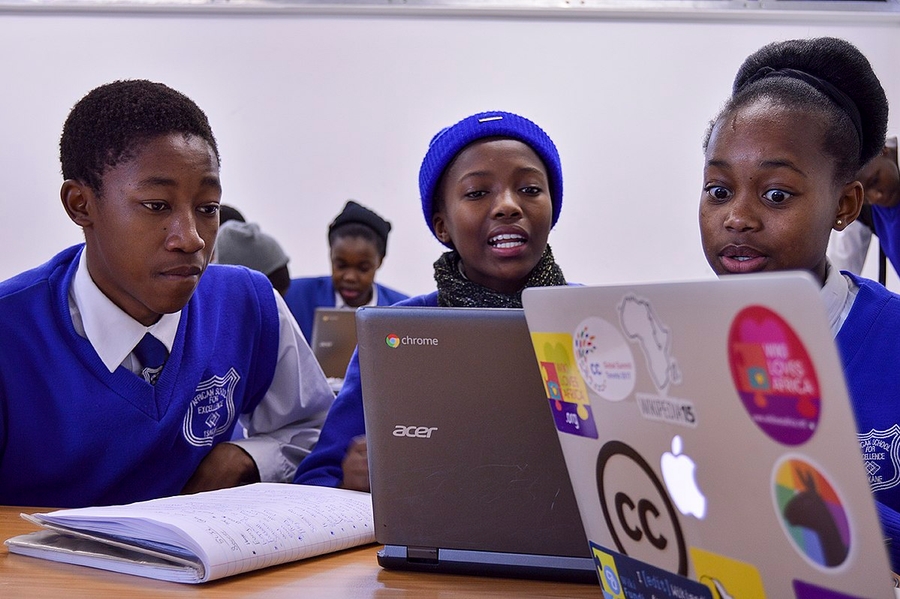
There are many differences in the quality of education received by learners in rural areas and those in urban areas. Resources that urban learners consider basic, seem impossible for most learners in rural areas to access. Resources that are considered as important to drive learning, training, skills development and business development remain inaccessible in some rural parts of South Africa. For example, the internet and electricity.
The reality
It is unpleasant and discouraging and to be young and far from essential resources for your personal development. That only forces you to think of leaving your rural area to look for better opportunities in urban areas. Unfortunately, that is what most young people are subjected to in South Africa. What is worse, is leaving a rural area for an urban area where you will find it hard to lead a modern life because you are illiterate and not competent for bigger opportunities, as a result of poor education.
Some of the issues that result in rural schools’ education low quality and unskilled production of young people include; not enough school buildings and stationery, shortage of skilled and experienced teachers, lack of technical training, lack of computer hardware and software etc.
Let’s look at how ICT (Information Communications Technology) can empower youth in rural areas through education. ICT is an in demand service used in the government, financial and business sectors. So it is highly important to address the issues in the education quality in rural areas, considering ICT as an essential tool for rural education development.
Are you reading and thinking, “I don’t even know what ICT is”?
ICT stands for Information Communications Technology, which in simple terms is defined as devices, systems, applications and networking elements that allow people and organisations to communicate in the digital world.
It is made up of the internet supported area and the mobile one which uses wireless network connections. The ICT system may also include landline phones, radio and television, which are still used today. But the most highly advanced innovations in ICT include Artificial Intelligence (AI) and robotics.
Here is how ICT can improve education in rural areas:
- Motivate learners - If learners would have access to computers with internet connectivity, they would be motivated to learn because computers allow for interactions with other people in real time. ICTs like videos, television and multimedia software that blend text, sound, colourful and moving images, can be used to create real and challenging content that will engage learners in the learning process.
- Enhance teacher training and skills - You would find that teachers in rural areas are not computer literate. With the introduction of ICT, teachers will be forced to learn the skills. When they have been trained, that would mean the issue of illiteracy is close to being solved.
- Active learning - With ICT, learning is enhanced and enables learners to learn as they do and work on real life problems. In that way, education is made less theoretical, less about memorisation and more about engagement. That is essential, because it prepares learners for higher education and the work environment.
- Collaborative learning - ICT assisted education motivates learners, teachers and experts to work collaboratively, regardless of where they are in the world. Because of that nature, learners are exposed to different cultures which also helps them develop communications skills. Collaborative learning plays a major role in grooming and preparing an individual for the world outside of school.
- Creative learning - Exposure to unlimited educational information gives learners the agency to become creative in terms of how they can manipulate the information, so much so that they could even create real - life products. Consequently, creative entrepreneurs are likely to be produced.
- Evaluative learning - This is another form of learning that builds critical thinkers and analytic individuals. ICT- supported learning does not recognise only one form of learning, which usually is to listen and remember. But with ICT, they are provided with the freedom of understanding information in ways that are helpful to them, unlike still and text based technologies.
Recommendations to successfully implement ICT - supported education in rural areas
- Provide money to install and improve electricity services in schools.
- Provide teachers with training to better understand the types of software and teaching programs they need to invest in, to improve their ways of educating.
- Train teachers on how to make use of technology and apply it to teaching the curriculum to learners.
- Provide schools with unlimited internet access at low cost and highly reliable network connectivity.
mPowa
mPowa, a member of the SA Youth Network, is a mobile app for South African youth, providing them with location-based and profile-specific information about services relating to employment, education and entrepreneurship in their vicinity.
© mPowa 2021